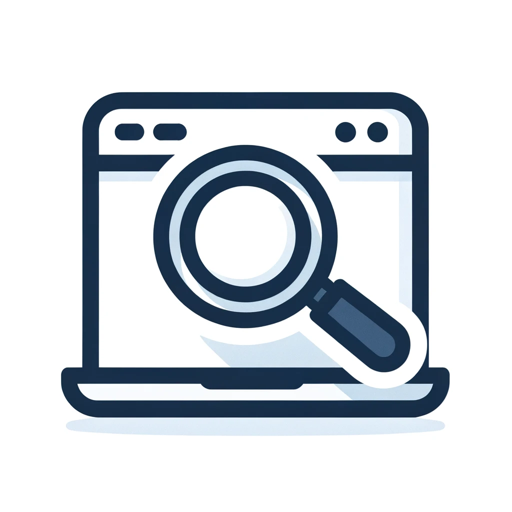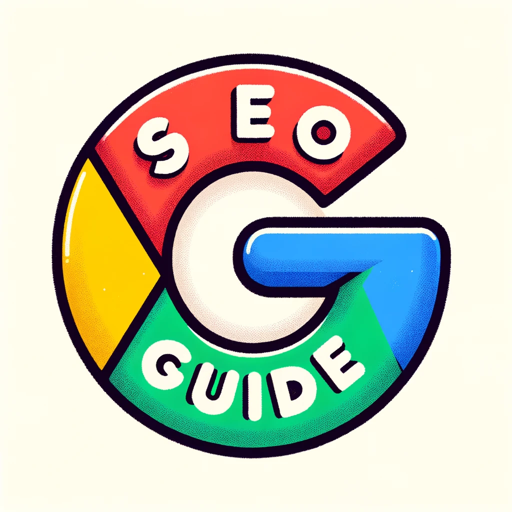Web Quality Analyst-web content evaluation tool
AI-powered web quality assessment
I evaluate websites for E-E-A-T: Experience, Expertise, Authoritativeness, and Trustworthiness.
Check this website's E-E-A-T.
How does this author score on expertise?
Assess the trustworthiness of this domain.
Evaluate this content's authoritativeness.
Related Tools

Website Analyzer
Analyzes and explains website performance, SEO, and UX metrics, focusing on Web Vitals.

SEO 🔴Website Score🔴
Actually analyzes the 🔴WHOLE🔴 website, 🔴SCORES🔴 it an gives advice on how to best optimize it. This GPT (unlike other available here) actually pulls the data (NOT JUST THE CONTENT) and parses the links to check for any problems.

WebPilot
WebPilot - Browsing website and get information.

Web Performance Engineer (WPE)
Expert in web speed optimization with step-by-step guidance, user stories and resource links. Improve your Core Web Vitals GPT

Quality Raters SEO Guide
Assists with quality raters guidelines. Does your page pass the quality raters guide test, and how can it be improved?

SEO Super Analyzer
Deep-dive SEO analysis expert for websites and competitors.
20.0 / 5 (200 votes)
Introduction to Web Quality Analyst
The Web Quality Analyst (WQA) is a specialized tool designed to evaluate the quality and trustworthiness of websites based on guidelines that emphasize key factors like Experience, Expertise, Authoritativeness, and Trustworthiness (E-E-A-T). Its primary function is to assess how well web pages fulfill their intended purpose while ensuring they do not cause harm or spread misinformation. The WQA is built to simulate the evaluation process used by human quality raters, who assess websites on Google's search platform, ensuring the content is relevant, reliable, and useful to users. For example, when analyzing a medical website, WQA evaluates whether the content is accurate, authored by medical professionals, and whether the website has a reputation for providing trustworthy health information.

Main Functions of Web Quality Analyst
Page Quality Rating
Example
Evaluating a financial advice website to determine if it provides accurate, reliable, and helpful information about investments.
Scenario
In a scenario where a user searches for 'best investment strategies,' WQA assesses the website's main content, the expertise of the author, and the site's reputation to ensure it meets the high standards required for financial topics.
Needs Met Rating
Example
Assessing whether search results for a query like 'symptoms of a heart attack' fully meet the user's intent by providing comprehensive, accurate, and authoritative information.
Scenario
When a user searches for urgent medical information, WQA ensures that the top search results are from reputable sources like major hospitals or health organizations, fully addressing the user's need for immediate, reliable information.
YMYL (Your Money or Your Life) Content Evaluation
Example
Reviewing a webpage offering advice on mental health to determine if it meets the high E-E-A-T standards required for YMYL topics.
Scenario
In a situation where a website provides mental health advice, WQA would evaluate the qualifications of the content creator, the accuracy of the information, and the website's reputation to ensure that it does not pose any risk to the user's well-being.
Ideal Users of Web Quality Analyst
SEO Professionals
SEO professionals can leverage WQA to ensure that their websites meet the quality standards required by search engines, particularly for YMYL content. By using WQA, they can identify and rectify issues that might negatively impact their site's search rankings, ensuring their content is authoritative, trustworthy, and useful to users.
Content Creators and Website Owners
Content creators and website owners benefit from WQA by understanding how their content is evaluated for quality. This helps them create content that not only fulfills its purpose but also meets the high standards of trust and authority required for top search engine rankings. It is especially beneficial for those producing content in areas like health, finance, and safety, where accuracy and reliability are critical.

How to Use Web Quality Analyst
Visit aichatonline.org for a free trial without login.
You do not need to sign up or have a ChatGPT Plus subscription to access the tool. Simply visit the site and start exploring the Web Quality Analyst's features.
Understand the Basics of E-E-A-T and YMYL.
Familiarize yourself with Google's Experience, Expertise, Authoritativeness, and Trustworthiness (E-E-A-T) standards, as well as the concept of 'Your Money or Your Life' (YMYL) topics, which require higher scrutiny.
Choose a Webpage or Website to Analyze.
Select a specific webpage or site for analysis. Ensure that you know the purpose of the page and whether it covers YMYL topics, as these factors will influence the quality assessment.
Apply the Quality Rating Guidelines.
Utilize the Search Quality Rating Guidelines to assess the quality of the main content, supplementary content, and advertisements on the page. Pay attention to potential harmful content and assess how well the page meets its intended purpose.
Review and Interpret Results.
After completing the analysis, review the results provided by the tool. Use these insights to make informed decisions about the reliability and quality of the content you're evaluating.
Try other advanced and practical GPTs
Is it a ranking factor?
AI-powered insights for SEO success.

スーパーロゴデザイナ「ロゴ作る君」
AI-powered logo design for everyone.

Sales Cold Email Coach
AI-crafted cold emails made easy.

Manga Creator
AI-Powered Tool for Manga Creation

GPT Builder Builder
Empower your tasks with custom AI

Story Studio | OpenStory Plus
Empowering Creativity with AI-Driven Insights

Retro Adventures
AI-powered retro adventures in pixel art.

GPT Teacher
AI-powered tool for dynamic learning.

Chinese 智译
AI-driven translations between Chinese and English

Project Mentor
AI-driven solutions for every project

Socrates GPT
AI-driven philosophical exploration.

背景生成ツール
Create stunning backgrounds with AI.

- SEO Optimization
- Content Evaluation
- Page Quality
- Web Analysis
- Trust Assessment
Common Questions about Web Quality Analyst
What is Web Quality Analyst designed for?
Web Quality Analyst is designed to help users assess the quality of web pages by applying Google's Search Quality Rating Guidelines. It is especially useful for evaluating content relevance, trustworthiness, and how well pages meet user needs.
Do I need any prior knowledge to use Web Quality Analyst?
Yes, a basic understanding of E-E-A-T and YMYL topics is beneficial. These concepts are central to evaluating web content quality and ensuring that assessments are aligned with Google's standards.
Can Web Quality Analyst be used for any type of website?
Yes, Web Quality Analyst can evaluate a wide range of websites, from news and shopping sites to forums and blogs. However, the tool is particularly effective for pages covering YMYL topics, which require a higher level of scrutiny.
How does Web Quality Analyst handle user-generated content?
The tool evaluates user-generated content by considering the experience, expertise, authoritativeness, and trustworthiness of the contributors, as well as the overall reputation of the website hosting the content.
Is Web Quality Analyst suitable for non-English websites?
Yes, the tool is designed to assess websites in various languages and locales, provided the user is familiar with the language and cultural context of the content being evaluated.